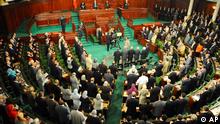For decades, women in the North African nation have enjoyed some of the most far-reaching rights in the Arab world. Many have successful careers in business and politics. For example, women account for nearly half the lawmakers in the ruling Islamist Ennahda party. But some women now perceive the new definition of gender roles as a threat to their freedoms.
'An open door' to rights abuse
One of these opponents is Selma Rekik, who runs a family business near Tunis that specializes in automobile cables and food processing. So far, she has always felt comfortable operating in sectors traditionally dominated by men.
"Sometimes when you start a new project [as a woman], people might be a bit wary," said Rekik. "But that changes as soon as you assert yourself, you show that you're efficient. I've been respected because the results have been good. In Tunisia, I haven't had any problems."
But the problematic clause in the constitution could change this. Thousands took to the streets in protest when it was made public in August.
 The ruling Ennahda party has been described as 'moderate Islamist'
The ruling Ennahda party has been described as 'moderate Islamist'
"Lawyers who have interpreted this article consider it an open door to other excesses that can compromise women's rights," said Rekik.
Rekik acknowledged she came from a privileged family where male and female members were treated equally. But she also saw other Tunisian women asserting themselves across the workforce. Many of her factory's employees are women - as are the farmers working for her food processing company.
"Very often, it's the women who work to pay for their children's food and clothing and their education. They're the element of stability in the family."
Rights activists like Khadija Cherif blame the Ennahda party, which inserted the offending paragraph, for going back on campaign promises to uphold women's rights. She believes more hard-line Islamists will twist the vague legal wording to suit their interests.
"It threatens equality," said Cherif. "Because when you talk about 'complementarity,' it could mean barring women from work - because it could mean that men work and women stay at home. It could even mean a return to polygamy."
Already, according to Cherif, women and even young girls are being pressured to wear the hijab, which used to be a rare sight on Tunisia's streets.
Defense from conservatives
But at Ennahda's headquarters, party leader Rachid Ghannouchi offered a more egalitarian interpretation of the controversial clause.
"In three different places, the constitution states that equality between men and women is guaranteed," Ghannouchi told DW. "In the fourth place, there is a reference to complementarity. While there is complementarity between women and men in the family setting, it doesn't mean one is better than the other, or has more rights or responsibilities."
 Tunisia's religious conservatives approve of the new laws
Tunisia's religious conservatives approve of the new laws
In fact, more conservative Tunisian women, like university student Hajer Ben Jemaa, argue that they have more rights today than before the revolution, because they can assert their religious beliefs.
"Today in Tunisia, I'm free to wear this hijab," said Ben Jemaa. "I don't have problems with the police or at school. With Ennahda I have hope."
Taking action
For her part, Rekik believes Tunisian women should be free to wear what they want. But she is not waiting for politicians to determine her future. Earlier this year, she helped to establish a new, secular party - Call of Tunisia (Nidaa Tounes) - founded by former prime minister Beji Caid el Sebsi.
"If I'm getting into politics now, it's because I want to fight for what we have achieved as women, as Tunisians," said Rekik. "I accept difference - the debate of ideas. But not regression - not rolling back women's rights."
Call of Tunisia is off to a good start. A recent poll placed the party second behind Ennahda, with 20 percent of Tunisians backing it.
The case has drawn nationwide attention in Tunisia, where a moderate Islamist-led coalition is working on a new constitution after decades of dictatorship. How it will define women's rights is a thorny question.
Protesters gathered at the central Tunis courthouse Tuesday to denounce what they say are unfounded claims against the 27-year-old woman.
The woman is being questioned Tuesday by investigators, who will decide whether to pursue the accusations against her. Her fiancé also faces an “indecency” charge which carries a possible jail sentence of up to six months.
She says two police officers stopped her in a car and raped her on September 3. The police officers deny wrongdoing, and say she was engaged in immoral behavior with her fiancé when they stopped her.
"The whole world supports me. I ask you for your support too," the tearful women told AFP outside the courthouse on Tuesday.
The alleged rapists say they took the couple by surprise in an "immoral position" just before the rape purportedly took place.
The three policemen involved, who were arrested shortly afterwards and are awaiting trial, face heavy sentences if found guilty, with rape at least in theory risking the death penalty in Tunisia.
In practice, no one has been executed for more than 20 years. Several hundred protesters gathered outside the court early on Tuesday waving banners and placards and shouting slogans in support of the woman.
 The ruling Ennahda party has been described as 'moderate Islamist'
The ruling Ennahda party has been described as 'moderate Islamist' Tunisia's religious conservatives approve of the new laws
Tunisia's religious conservatives approve of the new laws



No comments:
Post a Comment